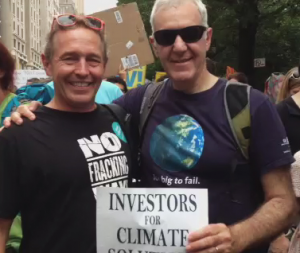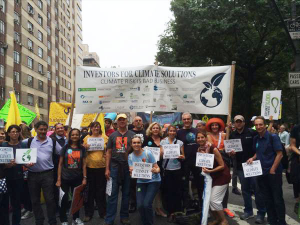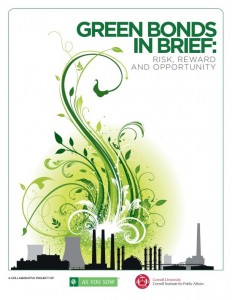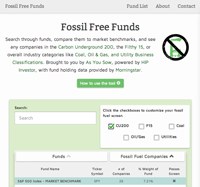
Welcome from our CEO
Welcome to As You Sow’s 2014 winter newsletter! In this edition, we have highlights from our 2014 shareholder resolutions, fresh engagement with ExxonMobil on climate risk, and updates on upcoming reports on fracking and CEO pay.
We also have exciting commitments from major companies on recycling, and we’re proud to announce a new Spinner Verification initiative at Responsible Sourcing Network. Our recent Green Bonds report showcases innovative financial tools applied to climate and environmental projects, and we say hello to our new Development Director Sarah Milne.
There’s also news on our shareholder resolutions with Hollywood studios on smoking in movies and Dunkin’ Donuts on nanomaterials in food. You can learn more about our upcoming Fossil Free Funds website, and our new fundraising effort to expand our digital presence.
Thank you for your continued support of As You Sow as we make the protection of your health and the environment a central part of corporate decision making. Please feel free to share this with your networks and connect with us on Twitter, Facebook, or LinkedIn.
Thank you for your support.
Best,


Andrew Behar, CEO
ExxonMobil Urged to Return Capital to Shareholders

ExxonMobil continues to invest in high-risk, high-carbon projects. IMAGE: Flickr/arbyreed
In a first-of-its-kind proposal, As You Sow and Arjuna Capital seek increased dividends or share buybacks from ExxonMobil given structural challenges facing the industry – historically high capital expenditures to extract riskier reserves, decreasing profitability, and global climate change. This represents the first shareholder proposal asking a company to return capital to shareholders in light of climate change risk.
ExxonMobil wrote a report in response to our last year’s shareholder proposal on the potential for stranded assets associated with climate change. Exxon ignored major risk factors projected by the International Energy Agency and Wall Street energy analysts regarding stranded carbon assets – i.e. that the company’s most-costly projects may become uneconomical in a low demand or low oil price environment.
“Exxon has taken a public position that demand for oil will continue to grow, no matter how warm the globe gets, no matter how harsh the impacts of that warming, and regardless of technology changes allowing for cheaper, cleaner renewable fuels,” said Danielle Fugere, President of As You Sow. “The recent U.S.-China accord on carbon emission reductions is just the latest indication that ExxonMobil’s view of the world does not square with reality. Our goal is to protect shareholders from the clear and inevitable changes to the global economy that mean ExxonMobil is likely to have substantial stranded carbon assets if it continues on its current path.”
Despite pressure from shareholders, the company has failed to stress test the impact of governments reacting appropriately to limit climate disruption to agreed upon international targets.
The recently announced U.S./China agreement to reduce carbon emissions stands in contrast to Exxon’s outlook and could cut demand substantially. The International Energy Agency states that, “No more than one-third of proven reserves of fossil fuels can be consumed prior to 2050 if the world is to achieve the 2° C goal” needed to avoid catastrophic climate change.
Over $109 Billion Voted in Favor of As You Sow Shareholder Resolutions in 2014
Shareholder advocacy continues to build its impact as investors press the companies they own to increase their responsibility. Proxy voting for shareholder resolutions that align with your values is a powerful force for creating positive, lasting changes in corporate behavior. Some highlights from As You Sow’s 2014 shareholder engagement season:
- We filed 23 shareholder proposals this year, the most resolutions we’ve ever filed. We plan to file even more in 2015.
- The 14 As You Sow resolutions that went to vote this proxy season earned the support of shares totaling over $109 billion.
- Our shareholder proposals earned an average of almost $4 billion in support. Our highest dollar total in support of a resolution was at Chevron, where our proposal asking the company to address the economic risks of climate change was supported by over $38 billion of investments.
- Our average vote in support was 16.3%, the highest support we’ve ever seen. Our highest vote percent was at Dr Pepper Snapple Group, where our resolution asking for increased recycling received 30.3% support, nearly a third of all shares voted.
- We withdrew six resolutions after successful dialogues with company management, leading to significant changes in corporate policies.
On the Horizon
- Our 2015 shareholder resolutions will press companies for more corporate responsibility and offer shareholders an opportunity to align their investments and their values.
- Our Survey of Sustainable Packaging at beverage and fast-food companies in collaboration with NRDC will be released before the end of the year.
- The second Disclosing the Facts fracking report will be released in December, looking at key performance indicators of the world’s biggest frackers.
- A new Executive Compensation Report on the top 100 overpaid CEOs in the S&P 500 will be released in early 2015.
- The Responsible Sourcing Network in collaboration with Sustainalytics will release an analysis of the first round of conflict minerals disclosure reports.
- The 11th annual Proxy Preview returns in early March 2015, offering an overview of environmental and social shareholder resolutions you’ll find on your proxy ballots. Proxy Updates will offer timely alerts on upcoming votes at select companies.
We will continue to use the power of shareholder advocacy to press companies to adopt strong environmental and social policies.
Walmart, P&G, McDonald’s Respond to Pressure on Waste
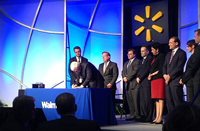
Walmart’s 2014 Sustainability Product Expo. IMAGE: news.pg.com
It’s been a summer of notable actions and accomplishments for our Waste program with several consumer giants taking substantive actions in response to our engagement. Walmart announced a $100 million Closed Loop Fund to finance improvements in recycling infrastructure, in part due to pressure generated by our program for companies to take responsibility for packaging recycling. Seven of eight founding fund companies had been previously pressed by us on this issue. The fund brochure even uses a graphic from our 2012 Unfinished Business report estimating that $11 billion of recyclable packaging is wasted annually. “The $100 million commitment is nowhere near adequate to finance improvements needed to recycling systems, but does represent an important ‘first step’ acknowledgement of responsibility by major consumer goods companies,” said As You Sow Senior Vice President Conrad MacKerron.
In a second major development, Procter & Gamble set a new goal that 90% of its packaging will be recyclable by 2020, or that systems will be in place to recycle packaging materials, including a commitment to find recycling solutions for pouches and other multi-laminate packaging that cannot now be recycled. The commitment came the day before an October 14 vote on a shareholder proposal filed by As You Sow asking the company to phase out unrecyclable packaging. The proposal won significant support – 25% of shares voted, representing more than $35 billion of investments.
Also, McDonald’s Corp. took an encouraging step toward recycling front-of-house restaurant consumer packaging waste; the company set a waste recycling goal of 50% in its top nine markets by 2020. The goal is not strictly for packaging waste as it includes food waste from back of house processing, but pilots will be done testing post-consumer packaging recycling in some areas.
As You Sow Builds an Enhanced Digital Presence
Led by our Board of Directors and top supporters, we are launching a fund-raising drive to implement an enhanced digital presence to amplify our efforts to activate shareholders and as an ongoing revenue stream. Join us as we extend our programs, our reach, and our impact, by building a network of support. Look for upcoming web and mobile apps that shine a light on the financial industry and cleantech investing.

The 100 Most Overpaid CEOs in the S&P 500

The ratio of CEO to average employee pay is 300 to 1.
Over 300 to 1 – that’s the ratio of CEO to average employee pay in the United States. The current system of executive pay distorts incentives, exacerbates income inequality, and leads consumers and employees to think the game is rigged against them. That’s why we created our new Executive Compensation initiative, pressing companies to better control and reduce unjustified CEO pay.
The Executive Compensation initiative is part of our new Power of the Proxy program, which focuses on offering shareholders the resources they need to vote their proxies and align their investments and values. A recent poll showed that only 18% of Americans think the pay of top corporate executives is appropriate. Yet for the most part, shareholder advisory votes give rubber-stamp approval to astronomical executive compensation packages. Our goal is to help shareholders, including mutual funds, pensions, foundation, endowments, and individuals create proactive change in a broken system.
We’ve already co-filed our first shareholder resolutions on Executive Compensation with Walgreens and with Apple.
As You Sow is also in the process of conducting a comprehensive analysis to shine a light on the 100 companies with the most problematic executive compensation practices in the S&P 500. We have analyzed over 30 criteria that represent red flags on compensation, in categories that focus on companies that perpetuate the upward spiral, issues related to sustainability, long-term performance, and others. The report will be released later this winter.
RSN Plans Spinner Verification Initiative to Disrupt Flow of Slave Cotton
A new effort from Responsible Sourcing Network (RSN) to verify spinning mills as being slave-free aims to drive the market away from cotton harvested with forced labor. Currently in the early planning stages, the Spinner Verification initiative will ensure that brands’ and retailers’ policies against forced labor in cotton harvesting are being adhered to by yarn spinners and textile mills.
RSN will be working with MADE-BY to undertake a feasibility study to benchmark Spinner Verification against other current initiatives interacting with yarn spinners and textile mills to determine the most appropriate way to harmonize the various efforts. The results of the study are expected to be completed by Q2, 2015. MADE-BY is an award-winning European NGO with in-depth experience and a thorough understanding of the apparel and textile manufacturing industries.
Recently, RSN’s Company Pledge Against Child and Adult Forced Labor in Uzbek Cotton expanded to include Tesco and Fast Retailing (UNIQLO), the world’s second and third-largest retailers, bringing the total list of signatories to 163. Signatories to the Cotton Pledge promise to actively avoid cotton sourced from Uzbekistan, where the government uses forced labor to meet mandatory production quotas. Preliminary statistics of human rights abuses during the 2014 Uzbek cotton harvest are now posted.
In addition, RSN’s Cotton Program will soon release an addendum to the Cotton Sourcing Snapshot, which was published in early 2014. The addendum will feature updated ratings of the 17 lowest-scoring companies reflecting actions they are now taking to avoid Uzbek cotton picked with forced labor.
Green Bonds Report Examines Debt-Financing Climate Projects
Green Bonds in Brief: Risk, Reward, and Opportunity, a new report from As You Sow and the Cornell Institute for Public Affairs, describes an exciting new financial instrument to help fund much-needed carbon reduction, energy efficiency, and other climate-related environmental projects.
Similar to traditional bonds, green bonds offer an opportunity for investors and issuers to encourage growth of green projects such as energy efficiency, renewable power, and cleaner transit. Accessing capital at the massive scale needed to finance a transition to a low carbon, sustainable economy is a tremendous challenge. But the green bond market is beginning to boom as investors clamor for fixed income investments with environmental attributes.
Estimated to reach over $100 billion in issuances next year, green bonds offer one more tool to fund the $53 trillion in energy investments needed by 2035 to avoid catastrophic climate change. Download Green Bonds in Brief from www.asyousow.org, or visit www.gogreenbonds.org to learn more.
Sarah Milne Joins As You Sow as Development Director

Sarah Milne, As You Sow’s new Development Director
As You Sow is proud to welcome Sarah Milne as our new Development Director, where she will spearhead our fundraising and development efforts.
“I’m excited to be part of As You Sow’s work promoting environmental and social corporate responsibility,” said Milne. “I look forward to all the positive change we’re able to create!”
Milne comes to us from Chabot Space & Science Center, where as head of Development she was responsible for raising the science museum’s budget through grants, gifts, and galas. Between Chabot and As You Sow, she served as Senior Consultant to the Sierra Club’s Beyond Oil Campaign, writing reports on tar sands-derived fuels in corporate fleets and on Enbridge’s Alberta Clipper tar sands pipeline. She has also written on carbon financing for the Big Sur Land Trust and on REDD+ carbon offset baseline issues. Before pivoting to the environment and climate change, she was Director of Marketing at a venture-funded tech start-up, and worked in financial analysis, marketing, and product management at Chevron and Ampex. She holds a B.A. from U.C. Berkeley with Highest Honors in Rhetoric; an M.B.A from Cornell; and a graduate certificate in Environmental Policy from the Monterey Institute of International Studies, a graduate school of Middlebury College.
Shareholders to Hollywood: Help Prevent 1,000,000 Smoking Deaths

An R rating for movies with smoking could save 1,000,000 lives.
Major media companies are under pressure from shareholders to eliminate cigarette smoking that young people see in movies. Smoking tobacco is the leading cause of preventable deaths in the U.S. and data shows that smoking and tobacco imagery in youth-friendly movies is the biggest contributor to initiation of smoking among youth. As You Sow, in collaboration with the Interfaith Center on Corporate Responsibility has filed shareholder resolutions with the Walt Disney Company and Viacom (parent of Paramount) asking to report on the public health impacts of smoking in its youth rated movies.
The Centers for Disease Control and Prevention (CDC) estimates that giving an R rating to movies with smoking could reduce the number of teen smokers by 18% and prevent over 1,000,000 deaths from smoking among U.S. children alive today. The causal link between smoking in youth-rated movies and teen tobacco use was established by peer-reviewed research in a 2012 report from the U.S. Surgeon General. According to a letter from 38 state’s Attorney General to Hollywood Studios, “Each time the industry releases another movie that depicts smoking, it does so with the full knowledge of the harm it will bring children who watch it.”
First-of-its-Kind Shareholder Vote on Nanomaterials in Food at Dunkin’

We found nanoparticles, which have not been proven safe for human consumption, in Dunkin’ Donuts. Credit: Jacqueline Argote
As You Sow’s shareholder proposal requesting a safety report on nanomaterials being used in Dunkin’ Brands donuts, the first resolution of its kind to go to a vote, was supported by 18.7% of shareholders representing $547 million.
Nanomaterials have not been proven safe for human consumption, and many have been found to be toxic in animal studies and in vitro studies. “The strong vote makes clear that shareholders are concerned about the risks of using nanomaterials in food products before they are proven safe for human consumption,” said Austin Wilson, Environmental Health Program Manager at As You Sow. “Investors want assurances that Dunkin’ is addressing this important public health issue.”
The resolution asked the company to report on actions it is taking to reduce or eliminate risk of human health impacts, such as eliminating or disclosing the use of nanomaterials until they are proven safe through long-term testing. The proposal also called on Dunkin’ to identify products or packaging that currently contains nanomaterials.
We are currently testing products from a range of manufacturers, and if nanomaterials are found in any of those products, we will be working with the manufacturer to address safety concerns raised by such use. In addition, we will likely re-file our shareholder resolution at Dunkin’ Donuts if the company continues to use nanomaterials without proving they are safe.
Exxon Fracking Report Fails to Respond to Investor Concerns

IMAGE: Tim Ruggiero via Earthworks
Earlier this year, in response to As You Sow’s shareholder proposal, ExxonMobil committed to providing increased transparency about the community and environmental risks associated with its hydraulic fracturing practices. As You Sow agreed to withdraw our resolution after Exxon promised to address how it manages risk for 26 key performance indicators from our 2013 report Disclosing the Facts: Transparency and Risk in Hydraulic Fracturing (published in conjunction with partners Green Century, Investor Environmental Health Network, and Boston Common).
When Exxon finally released its report, however, it failed to provide specifics that shareholders and impacted communities need, focusing instead on its belief that fracking is completely safe. “Exxon discussed general practices, but failed to provide concrete information on whether it is actually reducing the risks and impacts at each well where it is fracking,” said Danielle Fugere, President, As You Sow. “Discussions of how fracking operations might be safe in a perfect world are meaningless as are references to ‘industry studies.’ Concrete data on Exxon’s air emissions from its actual wells; testing of its water impacts before and after fracking; specific information on its water use and sourcing; amount of methane releases based on regular monitoring of all its wells; comprehensive data on road impacts; specifics of whether and how community complaints are addressed — this is the information that tells the real story of environmental harm and shareholder risk.”
Companies engaging in fracking without transparency risk harm to people and environment, legal liabilities, reputational damage, and even bans and moratoriums forcing production to shut down. This past election resulted in new moratoria going into effect, including in Texas.
As You Sow, in collaboration with our partners, will soon be releasing Disclosing the Facts 2014, an update to last year’s report, benchmarking the practices of 30 companies on a range of key performance metrics, operational impacts, and mitigation efforts. Visit www.disclosingthefacts.org for more information.
New Online Tool Empowers Individuals to Divest their Portfolios from Fossil Fuels
Fossil Free Funds, a new data-driven web platform created by As You Sow and sustainable-investment ratings expert HIP Investor, aims to provide an easy and interactive way to find fossil free funds and screen mutual funds. Featuring mutual fund holdings data from Morningstar, the tool will offer an interactive way to look behind the scenes and see which mutual funds have holdings in fossil fuel companies. Users will be able to select their own fossil fuel screen, choosing from exclusion criteria like the Carbon Underground 200 (the top 200 fossil fuel companies ranked by reserves), as well as utilities, smaller oil, gas and consumable fuel companies, and fossil fuel service industry companies like Halliburton.
The initial release will feature funds that are either completely or mostly fossil free. The tool will soon expand to add hundreds of mutual funds to enable anyone to check their portfolio or retirement fund to see exactly what they hold, how exposed they are to fossil fuels and the attendant risks, and how well their investments are aligned with their values.
“Almost no one really knows what they actually hold in their 401(k) and mutual funds, and how those investments align with their vision for a clean-energy future,” says As You Sow CEO Andrew Behar. “The Fossil Free Funds website and app shine a light on this issue and enables each of us to customize our portfolio to build the world we want to live in.”
Fossil Free Funds is currently in beta testing, and will be released to the public soon – stay tuned.
Investors for Climate Solutions Join UN Climate Week
On Sunday, September 21, 2014, As You Sow and the socially responsible investor community joined more than 400,000 people who took to the streets of New York to call for action on the threat of climate change, marching under the “Investors for Climate Solutions” banner.
Thank you to all of you who added your logo to the banner, and to everyone who marched with us in New York City. Together, we raised our voices to let the world know: in the face of impending catastrophic climate change, business as usual is no longer okay.
Visit www.investorsforclimatesolutions.org to learn more about the organizations that joined us.


